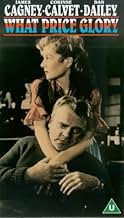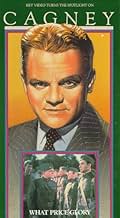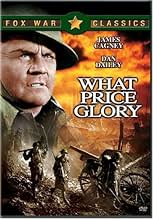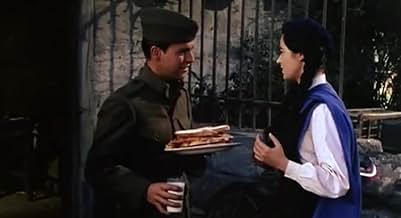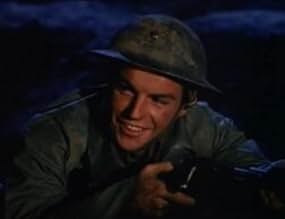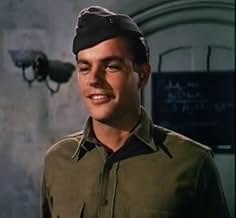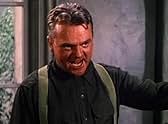AVALIAÇÃO DA IMDb
6,1/10
1,5 mil
SUA AVALIAÇÃO
Adicionar um enredo no seu idiomaThe wartime romantic misadventures of Captain Flagg, commander of a company of US Marines in 1918 France.The wartime romantic misadventures of Captain Flagg, commander of a company of US Marines in 1918 France.The wartime romantic misadventures of Captain Flagg, commander of a company of US Marines in 1918 France.
- Direção
- Roteiristas
- Artistas
Max Showalter
- Lt. Moore
- (as Casey Adams)
Luis Alberni
- Grand Uncle
- (não creditado)
Olga Andre
- Sister Clothilde
- (não creditado)
Tina Blagoi
- Mrs. Bouchard
- (não creditado)
Danny Borzage
- Gilbert
- (não creditado)
George Bruggeman
- German Lieutenant
- (não creditado)
Frederic Brunn
- German Officer
- (não creditado)
Paul Bryar
- Charmaine's Uncle
- (não creditado)
Avaliações em destaque
Well, despite having made "The Sands of Iwo Jima", John Ford made a movie about World War I Marines that doesn't really seem to be about Marines at all. I'm not a student of World War I Marine slang, but it seemed odd for Captain Flagg to pronounce Sergeant Quirt his "Top Soldier" and for Marines to refer to each other as soldiers. Despite the fact that they under French command, I found it odd for them to refer to being in the Army, since they are in the Corps. Go figure.
The two combat scenes are amateurish, even by Ford's standards. The acting is not convincing (except when Robert Wagner dies and Cagney manages not to over-act it) and while you can believe the two main characters don't like each other at the beginning, you never believe there's some odd tie binding them together. The character development is relatively tame, with only Wagner and Harry Morgan (Colonel Potter as a Marine Corporal and quartermaster!) showing any depth among the minor Marine characters.
Dan Dailey does play a convincing loud, parade ground senior NCO. He conveys the conniving and womanizing well, but when he is supposed to have finally fallen for the French beauty, it's hard to believe. Cagney plays merely a caricature of the hard-bitten, seen-it-all Marine. His final scene neither convinces you he considers staying or that the Corps means so much to him that he has to go.
The worst part is when a wounded Marine shouts out the title of the movie. It's something along the lines of "Are you going to get in the game, Captain? There's two minutes left and we need a hero. What price glory, Captain? What price glory?" One can imagine that delivered stirringly by a character whose motivation we understand, but instead, it is shouted by a nameless face with only a crazed look. It also would help if the Captain had been portrayed as a glory hound instead of drunken, war-weary yet sympathetic. I guess they had to get the name of the movie in somehow....
I was trying to imagine John Ford's World War I and was sadly disappointed that it wasn't more moving.
The two combat scenes are amateurish, even by Ford's standards. The acting is not convincing (except when Robert Wagner dies and Cagney manages not to over-act it) and while you can believe the two main characters don't like each other at the beginning, you never believe there's some odd tie binding them together. The character development is relatively tame, with only Wagner and Harry Morgan (Colonel Potter as a Marine Corporal and quartermaster!) showing any depth among the minor Marine characters.
Dan Dailey does play a convincing loud, parade ground senior NCO. He conveys the conniving and womanizing well, but when he is supposed to have finally fallen for the French beauty, it's hard to believe. Cagney plays merely a caricature of the hard-bitten, seen-it-all Marine. His final scene neither convinces you he considers staying or that the Corps means so much to him that he has to go.
The worst part is when a wounded Marine shouts out the title of the movie. It's something along the lines of "Are you going to get in the game, Captain? There's two minutes left and we need a hero. What price glory, Captain? What price glory?" One can imagine that delivered stirringly by a character whose motivation we understand, but instead, it is shouted by a nameless face with only a crazed look. It also would help if the Captain had been portrayed as a glory hound instead of drunken, war-weary yet sympathetic. I guess they had to get the name of the movie in somehow....
I was trying to imagine John Ford's World War I and was sadly disappointed that it wasn't more moving.
One of the great anti-war plays of the 1920s was Maxwell Anderson's What Price Glory. The play expressed popular American feeling that we were never going to war again like that and endure the slaughter in those trenches in France that occurred in the short time we were there. Remember we only declared war in 1917 and the thing had been going on in Europe for three years by the time we got there.
One of the things Woodrow Wilson as President and the American Expeditionary Force commander John Pershing insisted on was that the American army when fully trained would fight as a unit and not just be replacement troops for the French and British already there. They deviated only once from that policy when the American First Marine Division became the first American troops in battle in World War I at Belleau Wood. These Marines depicted here are part of those troops.
John Ford is one of our great American directors and when he does his own work on material never before used he's produced some remarkable cinema. But here he takes a serious anti-war play and turns it into one of his service comedies. There certainly are comedic elements in What Price Glory, but it's a serious picture.
The original silent film version done by Raoul Walsh was faithful to Maxwell Anderson's spirit and introduced those two Marines Edmund Lowe and Victor McLaglen who were so popular as Captain Flagg and Sergeant Quirt that they went and starred in a slew of buddy films. In fact they and James Cagney and Pat O'Brien introduced and popularized the buddy film genre.
Cagney steps into McLaglen shoes here and Dan Dailey plays Sergeant Quirt. They played two belligerent oafs in this and play them well, but no one ever thought of re-teaming them.
John Ford should have let this classic alone.
One of the things Woodrow Wilson as President and the American Expeditionary Force commander John Pershing insisted on was that the American army when fully trained would fight as a unit and not just be replacement troops for the French and British already there. They deviated only once from that policy when the American First Marine Division became the first American troops in battle in World War I at Belleau Wood. These Marines depicted here are part of those troops.
John Ford is one of our great American directors and when he does his own work on material never before used he's produced some remarkable cinema. But here he takes a serious anti-war play and turns it into one of his service comedies. There certainly are comedic elements in What Price Glory, but it's a serious picture.
The original silent film version done by Raoul Walsh was faithful to Maxwell Anderson's spirit and introduced those two Marines Edmund Lowe and Victor McLaglen who were so popular as Captain Flagg and Sergeant Quirt that they went and starred in a slew of buddy films. In fact they and James Cagney and Pat O'Brien introduced and popularized the buddy film genre.
Cagney steps into McLaglen shoes here and Dan Dailey plays Sergeant Quirt. They played two belligerent oafs in this and play them well, but no one ever thought of re-teaming them.
John Ford should have let this classic alone.
Built around cynicism and a love triangle that reminds me more of lesser Wilder or maybe even lesser Hawks than lesser John Ford, What Price Glory is a bit of a mess of a film about two romantic rivals competing over the affections of one woman with the backdrop of the First World War. A remake of a 1926 silent film starring long-time Ford stalwart Victor McLaglan (who does not appear in this film), it feels like Ford tried to twist a screenplay that didn't fit his sensibilities and only got so far, ending with a final product that never feels like it settles into one kind of story to tell.
Captain Flagg (James Cagney) leads a battalion of American troops behind the trench lines near the German front, having made his headquarters in a small French town where his men frequent the café and inn owned by the father of Charmaine (Corinne Calvet) with whom Flagg is having a love affair. Into this situation comes Flagg's newest officer, First Sergeant Quirt (Dan Dailey), who is to take responsibility for the welfare and training of the new recruits as top sergeant. The problem is that Flagg and Quirt have a history back in the Philippines when Quirt stole Flagg's girl, a girl Flagg had planned on marrying. The first half of the film is a borderline light comedy about the two men reigniting their animosity (having a pair of quick and impromptu boxing matches in Flagg's office), Quirt taking advantage of Flagg's trip to Paris when he leaves Charmaine behind by courting the pretty French girl, and Flagg trying to figure out if he's going to punish Quirt by forcing Quirt to leave Charmaine or marry her. There are other events, like Private Lewisohn (Robert Wagner) falling for another French girl Nicole Bouchard (Marisa Pavan), giving us the only remnants of the original idea of making the film a musical when Nicole sings a song to Lewisohn.
Then the battalion gets called to the front, and I thought I knew where the film was going to go. I thought, this being a John Ford film, the two men, Flagg and Quirt, would bond over their mutual experiences at the front. One of them would die in action, and the other would go back to Charmaine to marry her as much out of love for the girl as out of a sense of duty to the fallen comrade. I was confident for about twenty minutes as the film gained the kind of sober seriousness movies about trench warfare in World War I generally receive.
However, that's not what I actually got. Now, I'm not lukewarm on the film because it didn't play out as I expected. I'm lukewarm on it because what actually played out is some combination of not very good and confused. There's a serious tonal issue that begins popping up that never goes away that I feel is a symptom of a deeper problem and not the problem itself. The love triangle simply ends up continuing.
Flagg has been given a mission to sneak across enemy lines and capture a German officer in order to extract information about a potential big push by the Germans supposedly coming up soon. After sending several young men to die in one effort, Flagg, desperate to go back to Charmaine and deny Quirt the wedding Flagg himself had arranged for the pair, suddenly realizing the depths of his emotions for Charmaine, takes Quirt across the lines where they almost capture a German colonel who dies in the retreat back to the American lines. Then...in front of a wounded young soldier, Lewisohn brings in a German lieutenant randomly. It's almost comedic how the German prisoner suddenly appears right after Flagg and Quirt (who's been wounded and will be going back to the rear to potentially marry Charmaine) deliver their news of their failure. And then it becomes a chase as Flagg tries to figure out a way back to the rear while Quirt gets sent to a military hospital to deal with his wounds.
The cynicism of the two as they finally confront Charmaine, who goes from a fun cinematic creation in the beginning to a frustratingly indecisive and passive character by the end, trying to decide things as they get very quickly drunk and over a single hand of five card poker, feels nothing like what John Ford would deliver. This is where I began having my thoughts about the film feeling more at home in the body of work with either Wilder or Hawks. It wouldn't suddenly be a good film if the other two had made it, but it would just more naturally fit with the films around it. Ford is usually too heartfelt to offer up something this cynical.
And that cynicism is really what bothers me because it doesn't really feel like it belongs, which is seemingly a weird thing to say about a movie about World War I. Movies about The Great War generally should be cynical because of the wanton human suffering it caused, but the hour and a half that preceded that descent into cynicism doesn't support this. The film isn't actually about the waste of human life that was the war. The same story could have been told in the setting of World War II, to be honest, and not much would have needed to change outside the setting of the battle. It's about a love triangle in the time of war, the temporal nature of life in a warzone (reminding me in particular of They Were Expendable), and...then it seems to go off the deep end. The final moments of the film try to walk back the cynicism as well, with both Flagg and Quirt deciding to say goodbye to Charmaine forever to join up with the Big Push, as though it's Ford, in the movie's closing, trying to insert that common motif of the brotherhood of arms that is the military. But it creates this real whiplash at the ending.
Cagney also feels wrong for the role of Flagg. He may actually be part of the problem with the tone of the latter parts of the film because he simply cannot calm down in a scene. He has to be the center of attention, even if the scene is quiet. Dan Dailey fares better as Quirt, though since he's often sharing scenes with Cagney he can sometimes get lost. The character of Charmaine may end up devolving a bit in the face of the two men fighting over her (I would have really liked it if she had simply walked out on both men during the poker game, but alas, she does not), but Corinne Calvet has a wonderful sense of life and sadness about her that mostly makes up for the latter changes in her character. Wagner also has a certain melancholy and innocence that the movie can't quite take advantage of.
It's also often quite nice to look at. Once again returning to use Technicolor, Ford used color well and intelligently, especially in the trenches. There's a moment where Lewisohn moves into the doorway of a shelter, infused with red-lit fog in the corner of the frame, and it's quite striking. There are also moments in No Man's Land that could be considered beautiful if not for the brutality on display.
I'm now curious to watch the original 1926 film to see if that shares some of the same problems or even ends the same way. Ford was famous for using scripts as recommendations as much as an actual guide, and it wouldn't surprise me if he had riffed a lot of the action on screen with his actors (abusing them all the way, surely) while never really addressing how what he was doing was going to affect the overall film. Its opening is too nice, and its second half is too handsome to dismiss the film out of hand. However, it's really not any kind of lost gem.
Captain Flagg (James Cagney) leads a battalion of American troops behind the trench lines near the German front, having made his headquarters in a small French town where his men frequent the café and inn owned by the father of Charmaine (Corinne Calvet) with whom Flagg is having a love affair. Into this situation comes Flagg's newest officer, First Sergeant Quirt (Dan Dailey), who is to take responsibility for the welfare and training of the new recruits as top sergeant. The problem is that Flagg and Quirt have a history back in the Philippines when Quirt stole Flagg's girl, a girl Flagg had planned on marrying. The first half of the film is a borderline light comedy about the two men reigniting their animosity (having a pair of quick and impromptu boxing matches in Flagg's office), Quirt taking advantage of Flagg's trip to Paris when he leaves Charmaine behind by courting the pretty French girl, and Flagg trying to figure out if he's going to punish Quirt by forcing Quirt to leave Charmaine or marry her. There are other events, like Private Lewisohn (Robert Wagner) falling for another French girl Nicole Bouchard (Marisa Pavan), giving us the only remnants of the original idea of making the film a musical when Nicole sings a song to Lewisohn.
Then the battalion gets called to the front, and I thought I knew where the film was going to go. I thought, this being a John Ford film, the two men, Flagg and Quirt, would bond over their mutual experiences at the front. One of them would die in action, and the other would go back to Charmaine to marry her as much out of love for the girl as out of a sense of duty to the fallen comrade. I was confident for about twenty minutes as the film gained the kind of sober seriousness movies about trench warfare in World War I generally receive.
However, that's not what I actually got. Now, I'm not lukewarm on the film because it didn't play out as I expected. I'm lukewarm on it because what actually played out is some combination of not very good and confused. There's a serious tonal issue that begins popping up that never goes away that I feel is a symptom of a deeper problem and not the problem itself. The love triangle simply ends up continuing.
Flagg has been given a mission to sneak across enemy lines and capture a German officer in order to extract information about a potential big push by the Germans supposedly coming up soon. After sending several young men to die in one effort, Flagg, desperate to go back to Charmaine and deny Quirt the wedding Flagg himself had arranged for the pair, suddenly realizing the depths of his emotions for Charmaine, takes Quirt across the lines where they almost capture a German colonel who dies in the retreat back to the American lines. Then...in front of a wounded young soldier, Lewisohn brings in a German lieutenant randomly. It's almost comedic how the German prisoner suddenly appears right after Flagg and Quirt (who's been wounded and will be going back to the rear to potentially marry Charmaine) deliver their news of their failure. And then it becomes a chase as Flagg tries to figure out a way back to the rear while Quirt gets sent to a military hospital to deal with his wounds.
The cynicism of the two as they finally confront Charmaine, who goes from a fun cinematic creation in the beginning to a frustratingly indecisive and passive character by the end, trying to decide things as they get very quickly drunk and over a single hand of five card poker, feels nothing like what John Ford would deliver. This is where I began having my thoughts about the film feeling more at home in the body of work with either Wilder or Hawks. It wouldn't suddenly be a good film if the other two had made it, but it would just more naturally fit with the films around it. Ford is usually too heartfelt to offer up something this cynical.
And that cynicism is really what bothers me because it doesn't really feel like it belongs, which is seemingly a weird thing to say about a movie about World War I. Movies about The Great War generally should be cynical because of the wanton human suffering it caused, but the hour and a half that preceded that descent into cynicism doesn't support this. The film isn't actually about the waste of human life that was the war. The same story could have been told in the setting of World War II, to be honest, and not much would have needed to change outside the setting of the battle. It's about a love triangle in the time of war, the temporal nature of life in a warzone (reminding me in particular of They Were Expendable), and...then it seems to go off the deep end. The final moments of the film try to walk back the cynicism as well, with both Flagg and Quirt deciding to say goodbye to Charmaine forever to join up with the Big Push, as though it's Ford, in the movie's closing, trying to insert that common motif of the brotherhood of arms that is the military. But it creates this real whiplash at the ending.
Cagney also feels wrong for the role of Flagg. He may actually be part of the problem with the tone of the latter parts of the film because he simply cannot calm down in a scene. He has to be the center of attention, even if the scene is quiet. Dan Dailey fares better as Quirt, though since he's often sharing scenes with Cagney he can sometimes get lost. The character of Charmaine may end up devolving a bit in the face of the two men fighting over her (I would have really liked it if she had simply walked out on both men during the poker game, but alas, she does not), but Corinne Calvet has a wonderful sense of life and sadness about her that mostly makes up for the latter changes in her character. Wagner also has a certain melancholy and innocence that the movie can't quite take advantage of.
It's also often quite nice to look at. Once again returning to use Technicolor, Ford used color well and intelligently, especially in the trenches. There's a moment where Lewisohn moves into the doorway of a shelter, infused with red-lit fog in the corner of the frame, and it's quite striking. There are also moments in No Man's Land that could be considered beautiful if not for the brutality on display.
I'm now curious to watch the original 1926 film to see if that shares some of the same problems or even ends the same way. Ford was famous for using scripts as recommendations as much as an actual guide, and it wouldn't surprise me if he had riffed a lot of the action on screen with his actors (abusing them all the way, surely) while never really addressing how what he was doing was going to affect the overall film. Its opening is too nice, and its second half is too handsome to dismiss the film out of hand. However, it's really not any kind of lost gem.
"Capt. Flagg" (James Cagney) leads a squadron of American marines in France towards the end of the Great War and is unexpectedly reunited with his rival in just about everything, "Sgt. Quirt" (Dan Dailey). Despite their differences in rank, the two compete on an even playing field most of the time - usually fuelled by booze and because they are chasing the same girl. The latter, in this instance, is "Charmaine" (Corinne Calvet) but what neither man realises is that she's got an agenda of her own, and her father is out to help her too - to get an husband. What now ensues sees the grimness of the war tempered by some light-hearted humour, but Cagney isn't really given enough to challenge him by John Ford and the film sort of crawls along in a very procedural fashion with too little action to sustain it's almost two hour duration. Though it would probably have been below his pay grade, I kept thinking that Sterling Hayden would have made for a better antagonist for "Flagg" but the scenes with Dailey and Cagney do inject some life here, and the narrative does sometimes remind us of the trauma of war, but for the most part I felt this a rather lacklustre effort from all concerned that isn't really very funny and that I'll quickly forget.
In the mid-1920s, when What Price Glory? debuted as a play and was filmed for the first time, there was a popular anti-war mood, and cultural works attacking the First World War proliferated. In the early-1950s, with World War Two a recent memory and the Korean war still going on, war movies of every kind were at the height of their popularity, but there was no way they could be openly anti-militaristic. Hence, when Fox Studios decided to resurrect the classic story in 1952 it was largely a comical and de-politicised affair.
With a screenplay by Henry and Phoebe Ephron, this version of What Price Glory? uses virtually none of Maxwell Anderson's original dialogue. The job of direction was handed to John Ford, who was known for staging extended improvisations, creating little vignettes of military life with comical drunkenness and good-natured fistfights. In What Price Glory? this is done to the extent that it actually overshadows any semblance of plot. And not just the anti-war business; the romantic subplots seem weak and disjointed as well.
That's not to say there aren't some good things about this picture. The Technicolor cinematography by Joe MacDonald is often breathtaking, giving a haunting quality to the mist-shrouded battlegrounds. Ford was as always a good visual director, often using stark contrasts in depth to bring different ideas to our attention in the one shot. For example, as the troops march off to the front, a mass of drab browns and greys, we see Corinne Calvet in a bold red, white and blue dress – a human flag and a reminder of what the men are leaving behind them. And James Cagney is good fun in one of his purely comic roles.
But there is little else to recommend about this What Price Glory? Various scenes look to have been filmed with an emphasis on pathos, but they don't work within the structure of the whole thing. When a young Robert Wagner makes the central speech in which the words of the title are spoken, it seems barely to relate to the rest of the picture. And it's not the mixing of comedy with the realities of war per se that makes it fall apart – after all this is the basis of such classics as The Big Parade and MASH – it's just that the balance is wrong. It simply fails to take the war seriously enough, and the "serious" moments seem like flimsy little inserts. Of course, if it had been a tight and hard-hitting anti-war drama, it would most likely have fallen foul of the censors and/or stifled the careers of its creative team. As it was, this vague mish-mash of bar songs and army jokes was conveniently inoffensive.
With a screenplay by Henry and Phoebe Ephron, this version of What Price Glory? uses virtually none of Maxwell Anderson's original dialogue. The job of direction was handed to John Ford, who was known for staging extended improvisations, creating little vignettes of military life with comical drunkenness and good-natured fistfights. In What Price Glory? this is done to the extent that it actually overshadows any semblance of plot. And not just the anti-war business; the romantic subplots seem weak and disjointed as well.
That's not to say there aren't some good things about this picture. The Technicolor cinematography by Joe MacDonald is often breathtaking, giving a haunting quality to the mist-shrouded battlegrounds. Ford was as always a good visual director, often using stark contrasts in depth to bring different ideas to our attention in the one shot. For example, as the troops march off to the front, a mass of drab browns and greys, we see Corinne Calvet in a bold red, white and blue dress – a human flag and a reminder of what the men are leaving behind them. And James Cagney is good fun in one of his purely comic roles.
But there is little else to recommend about this What Price Glory? Various scenes look to have been filmed with an emphasis on pathos, but they don't work within the structure of the whole thing. When a young Robert Wagner makes the central speech in which the words of the title are spoken, it seems barely to relate to the rest of the picture. And it's not the mixing of comedy with the realities of war per se that makes it fall apart – after all this is the basis of such classics as The Big Parade and MASH – it's just that the balance is wrong. It simply fails to take the war seriously enough, and the "serious" moments seem like flimsy little inserts. Of course, if it had been a tight and hard-hitting anti-war drama, it would most likely have fallen foul of the censors and/or stifled the careers of its creative team. As it was, this vague mish-mash of bar songs and army jokes was conveniently inoffensive.
Você sabia?
- CuriosidadesJohn Ford was an uncredited second unit director in the 1926 version directed by Raoul Walsh.
- Erros de gravaçãoCaptain Flagg's command was referred to as L Company, 5th Marines. In WWI Marine Companies were numbered. Prior to WWI they served independently with battalions and above were ad hoc organizations. 5th Marines should 5th Regiment. The change from Regiment to Marines wouldn't come until the 30s.
- Citações
Captain Flagg: It's a lousy war, kid... but it's the only one we've got.
- ConexõesFeatured in Jogo de Paixões (1970)
- Trilhas sonorasOui, Oui, Marie
(uncredited)
Music by Fred Fisher
Lyrics by Al Bryan and Joseph McCarthy
Sung by Corinne Calvet and chorus
Principais escolhas
Faça login para avaliar e ver a lista de recomendações personalizadas
- How long is What Price Glory?Fornecido pela Alexa
Detalhes
- Data de lançamento
- País de origem
- Idiomas
- Também conhecido como
- What Price Glory
- Locações de filme
- Marine Corps Base Camp Pendleton, Califórnia, EUA(army base scenes)
- Empresa de produção
- Consulte mais créditos da empresa na IMDbPro
- Tempo de duração1 hora 51 minutos
- Proporção
- 1.37 : 1
Contribua para esta página
Sugerir uma alteração ou adicionar conteúdo ausente

Principal brecha
By what name was Sangue por Glória (1952) officially released in India in English?
Responda

